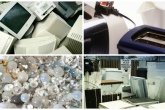Moving on from peak lamp WEEE
Nigel Harvey, Chief Executive at Recolight, takes a look at the decline in fluorescent lamp waste amid a rise in more sustainable LED lighting alternatives

Environment Agency data shows the total tonnage of waste fluorescent lamps collected in the UK dropped from 7,529 tonnes in 2015, to 6,315 tonnes in 2016. That decline almost certainly heralds a further steady decline in 2017 and beyond. Why is this happening, and what are the consequences?
A changing market for new lighting
Walk through a new shopping centre, or through town at night. Stop for a moment, and glance upwards. Take a look at the light fittings above your head. Increasingly, you will see new LED lighting. Fluorescent tubes are being substituted by fittings with a built in-LED light source – with no tube to replace. Likewise, orange sodium streetlights are disappearing and are being replaced by bright white grids of LED light – with no removable bulb.
This transformation is rapidly gaining momentum. Built-in LED light fittings are more sustainable: they use less energy and last longer. Banks, supermarkets, factories and local/ central government are all driving the change, seeking lower running costs and a reduced carbon footprint. This has also been changing the lamp waste that arises. As traditional fittings and lamps are removed, there has been a peak of lamp waste, particularly as some lamps are removed before they reach their usual replacement time. But once a conventional fitting has been changed for an integrated LED fitting, no more fluorescent waste will arise from that lighting point. And as these points are upgraded, fluorescent waste will start to fall. At Recolight, we think we have passed that point. From now on, we believe waste lamp tonnages will start to decline.
Government targets mean free lamp recycling
For the last two years, the Department for Environment, Food & Rural Affairs (Defra) has set a lamp recycling target intended to reflect the tonnage of waste lamps likely to arise. The 2017 target is around 11 per cent lower than the 2016 target. Nevertheless, it should still be close to the tonnage of waste lamps that will arise in 2017. That means waste electrical and electronic equipment (WEEE) producer compliance schemes (PCS), such as Recolight, are being encouraged to finance most, if not all waste lamps collected.
Given that the WEEE Regulations are ‘producer pays’ legislation, collectors of waste lamps should still be able to access a free service. That’s how Recolight, the UK’s largest lighting compliance scheme operates. The company provides eligible waste lamp collectors with a free container, and with free collection/recycling.
 This article was taken from Issue 88
This article was taken from Issue 88Additional protections for household waste recycling centres
If a high target was not enough to ensure that waste lamps are financed by PCSs, the UK law has an additional safeguard for HWRCs. Regulation 34 of the WEEE Regulations 2013 requires any PCS accredited to deal with household WEEE to collect any WEEE deposited at an HWRC in just five days.
There are a few conditions, but that simple clause means waste management companies can have a high degree of confidence that they will not be left with unfunded waste lamps.
Long-term outlook
Although the tonnage of waste lamps will fall for several years, in the long term, there will be another spike. That will happen when the number of longer lasting LED lamps reaching end of life starts to rise. Given that many users have difficulty in distinguishing traditional lamps from LED lamps, they will be co-collected as waste for many years to come.
Likely impact of Brexit
Anyone willing to stick their neck out to suggest what might happen to legislation post-Brexit is brave (or foolish). But so far, the UK’s WEEE system is working well, and at this stage material changes seem unlikely in the immediate post-Brexit world.
The Great Repeal Bill will ensure that, subject to minor technical amendments, the existing UK WEEE Regulations will continue to have a legal basis in the medium term. It remains to be seen the extent to which UK environmental legislation continues to mirror or diverge from that in place across Europe in the longer term. 








